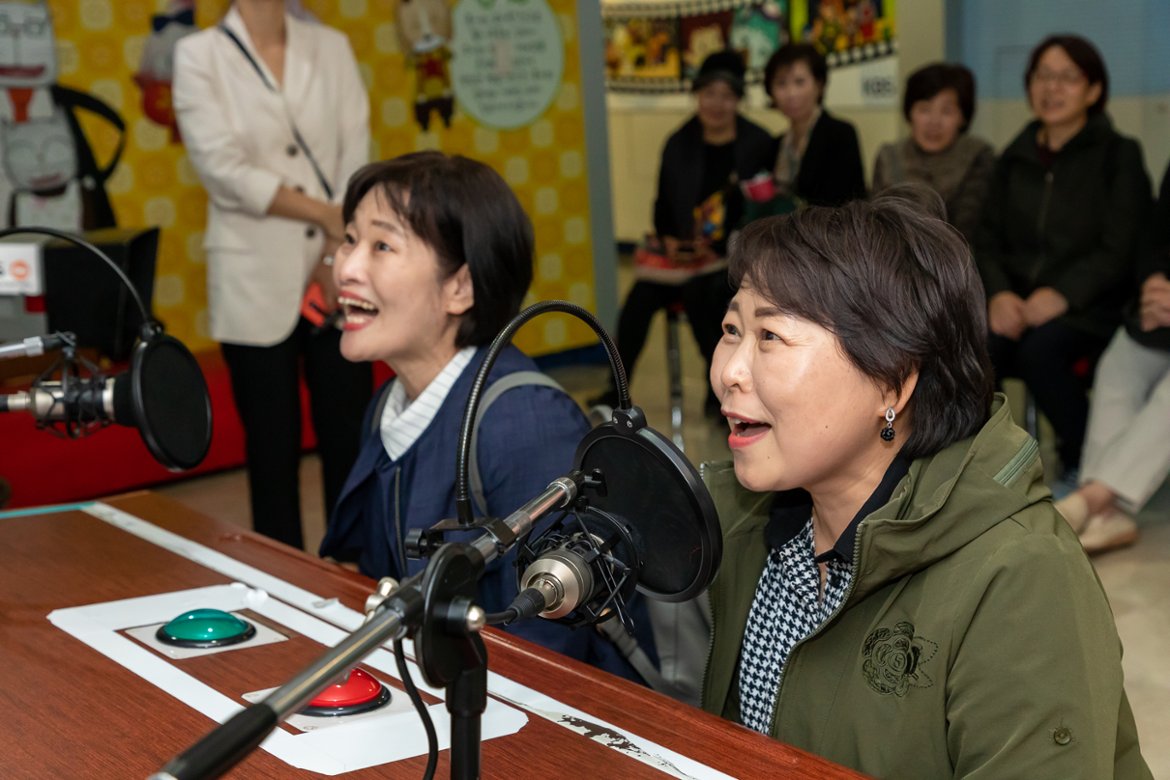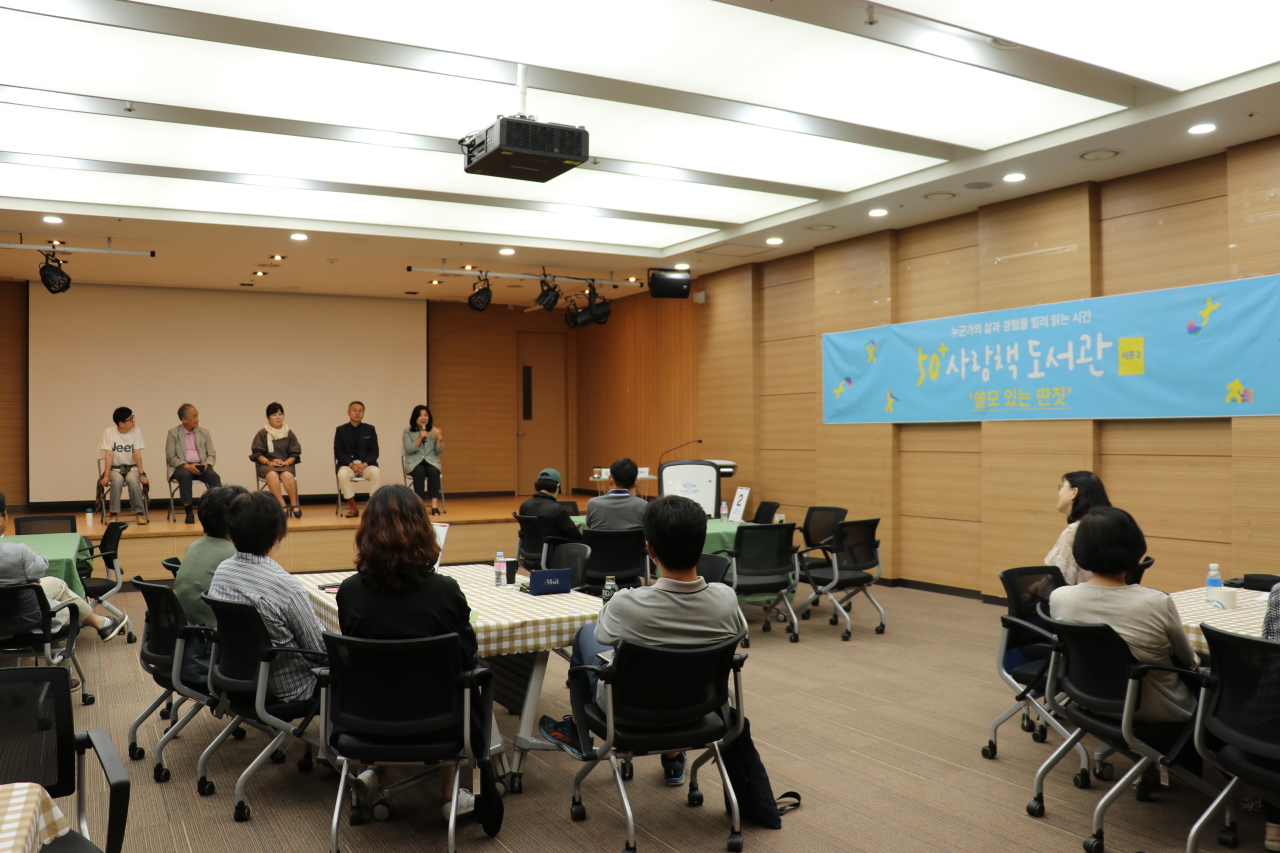
Two women try voice acting at a KBS studio in Seoul on Oct. 10, 2019. (Seoul50Plus Foundation)
Yoo Seo-kyung turns 56 this year, but she doesn’t mind getting older.
Yoo is excited about the year ahead as she just got into graduate school and now has a chance to delve more deeply into her handicraft hobby.
Several years ago, Yoo retired from the private math academy she ran for 10 years. Running the place had become more difficult as she found herself facing an ever-widening generation gap with her teenage students.
After retirement, Yoo took an interest in the craft of “jiseung,” the use of Korean traditional paper to make objects such as vases and plates. She will now be studying it more professionally at Sungshin Women’s University.
“I never really gave my age a thought until I learned that I was the oldest (in my major),” Yoo said. But that hasn’t fazed her.
“I don’t think I am old. There are too many things I want to do, and I feel it is never too late to start, because this is the youngest day of my life.”
Like Yoo, many people in their 50s and 60s are redefining traditional expectations for their age group. They may be close to retirement by conventional standards, but they are discovering new roles in society and enjoying a post-retirement heyday, as they consider themselves only about halfway into a 100-year lifespan.
They have carved out a new definition for themselves: “older people with active lifestyles,” or OPALs.
The book “Trend Korea 2020” predicts that OPALs -- roughly, people born 1955-1965 -- will be among the top trendsetters this year.
The OPAL generation, the driving force behind the country’s economic growth and democratization, is relentless and passionate, according to the book, and holds significant consumer power.

Trot Singer Jang Min-ho represents Ildong Foodis’ Himmune Protein Balance. (Ildong Foodis)
The popularity of TV Chosun music competitions “Miss Trot” and “Mr. Trot” showed that the older crowd -- despite having been a lower priority for the media than younger people -- can be just as enthusiastic about their preferred music genres as young fans of idol groups, but with fatter wallets.
Retailers rushed to hire trot singers as spokespeople for products that appeal to older age brackets.
Bohae Co., a liquor maker that produces regional soju brand Ipsaeju, hired “Miss Trot” winner Song Ga-in in December. In January, it saw its sales increase 20 percent on-year.
Ildong Foodis, a milk powder manufacturer, hired trot singer Jang Min-ho, one of the “Mr. Trot” finalists, to promote its Himmune Protein Balance, a protein powder for seniors. Maeil Dairies picked “Mr. Trot” winner Lim Young-woong as the spokesperson for its coffee brand Barista Rules this month.
The market has rediscovered the OPAL generation as an influential consumer group.
According to e-commerce platform Auction, purchasing by consumers in their 50s showed 130 percent growth between 2014 and the first half of 2018. For people in their 60s, the figure was 171 percent, the highest for all age groups.
Fashion trends for people in their 50s and 60s appear to be getting “younger” as well.
Shinsegae Department Store said customers in their 50s accounted for 42.9 percent of sales of contemporary brands in 2019, while those in their 40s bought 32.7 percent and people in their 30s accounted for 20.7 percent.
Hyundai Department Store witnessed a sharp increase of 15.1 percent in purchases of contemporary fashion brands by people in their 50s and older between 2018 and 2019.
“Unlike their seniors, the OPAL generation is more active after retirement. They are eager to start a new career and enjoy leisure activities,” according to Kim Nan-do, one of the authors of “Trend Korea 2020.
“They are also used to the internet and smartphones. So they continue to pursue their tastes and brands, like the younger generation, and are creating new consumer patterns.”

Participants listen to a lecture offered at the Seoul50Plus Foundation. (Seoul50Plus Foundation)
The OPAL generation appears to have a different attitude toward aging, as they were brought up in a more affluent time than their parents and are better educated, said Koh Seon-ju, a department chief at the Seoul50Plus Foundation.
The Seoul50Plus Foundation was established by the Seoul Metropolitan Government to support the population aged between 50 and 65 by providing a space for learning and social activities.
Since it opened in 2016, more than 860,000 people in their 50s and 60s have taken part in courses, volunteer work and community activities through the organization, Koh said. The foundation offers opportunities for older people to try out new activities, such as drawing, computer coding or running a radio program.
Startup company Shareus launched Banseojae, a book club community for those over 50, this month. For a monthly fee of 300,000 won ($245), members can join groups organized along different themes where they can meet and share their thoughts.
Due to the social distancing trend amid the COVID-19 outbreak, the service kicked off with 50 members, rather than the expected 80. But many expressed interest in joining the club, and the turnout would have been much higher had it not been for the pandemic, the company explained.
“These community organizing services were more popular among the younger generation, and I could not find any for the older generation,” said Lee Byung-hoon, CEO of Shareus.
“I found that the demand is high among the OPAL population, who often feel lost from retirement. They are more eager to overcome isolation and start the second chapter of their lives, compared to their seniors.”
Moon Sung-hoo, 55, who was picked as one of 10 Banseojae group leaders out of 140 applicants, stressed the importance of leaving a place in society for the aging population.
“Our bodies may have aged, but we never see ourselves as old,” he said.
“In society, however, the younger generation has a bigger voice and we lose our place in the social network. But I think it is important that each generation gets enough space in a society.”
Moon, formerly a lawyer and a speaking expert, said his book group will be about how to live with a youthful mindset.
South Korea became an aged society in 2018, with the population over 65 years old accounting for over 14 percent of the population. It is expected to become a “superaged society” by 2026, with that figure rising to 20 percent.
“Society doesn’t pay much attention to the retired population. Many people who were once in managing positions as leaders of companies and households feel anxious after retirement,” Koh said.
“As society is graying, it is crucial that both the public and private sectors expand support and services for the senior members of society.”
By Jo He-rim (
herim@heraldcorp.com)








![[KH Explains] How should Korea adjust its trade defenses against Chinese EVs?](http://res.heraldm.com/phpwas/restmb_idxmake.php?idx=645&simg=/content/image/2024/04/15/20240415050562_0.jpg&u=20240415144419)